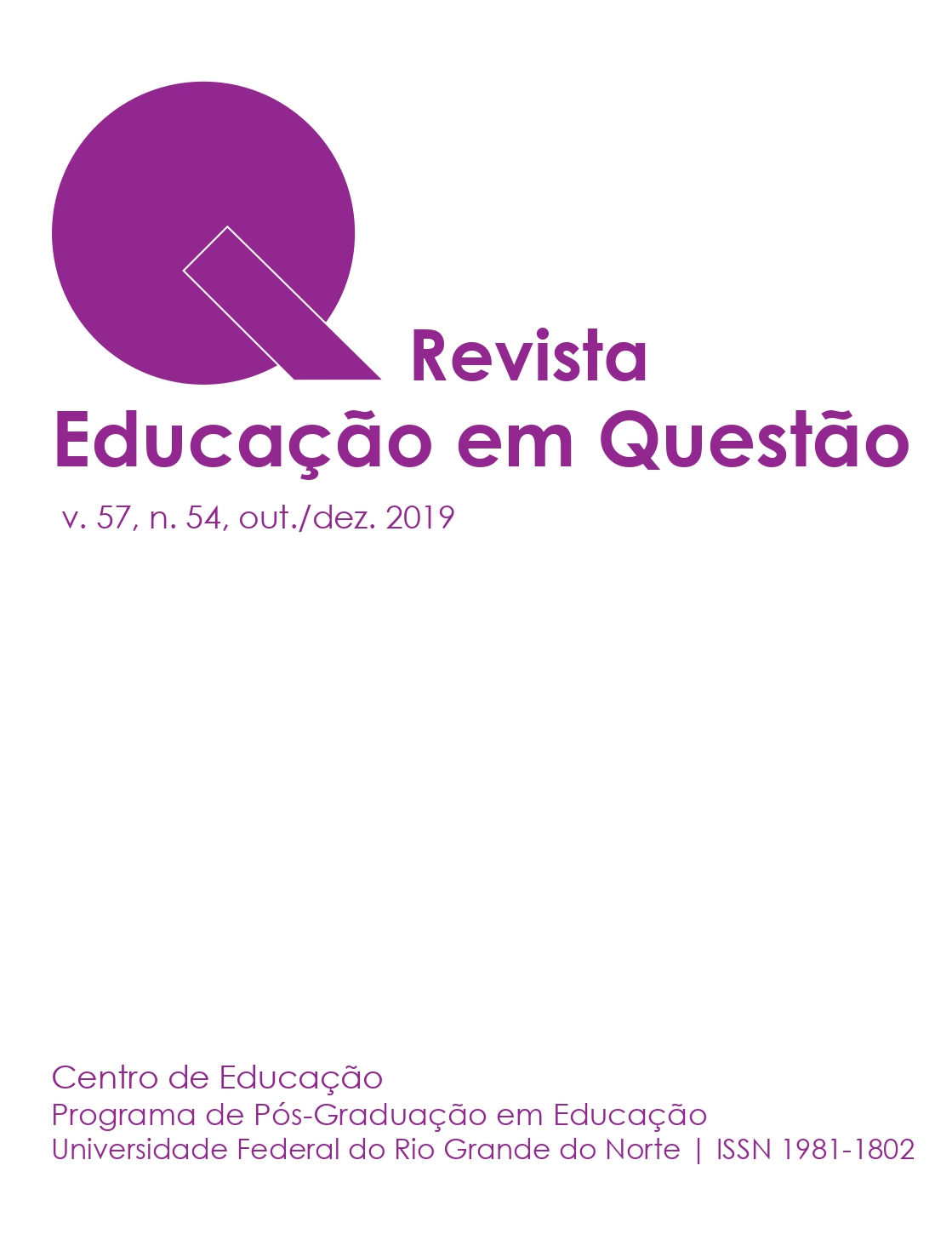The Body in the Scene: (Co) Possibilities with Inclusive Education
DOI:
https://doi.org/10.21680/1981-1802.2019v57n54ID18925Palavras-chave:
Corpo. Inclusão. Crianças. Aprendizagem.Resumo
Este artigo é o resultado de uma dissertação de mestrado que teve como objetivo apresentar uma proposta de intervenção docente tendo o corpo como eixo estruturante em uma perspectiva inclusiva. Assim, assumimos os princípios da pesquisa qualitativa, pelo viés da pesquisa-ação colaborativa, ancorada nos fundamentos epistemológicos de Merleau-Ponty. O itinerário da pesquisa se efetivou através da realização de 08 oficinas pedagógicas, que possibilitaram vivências coletivas, co-produção de saberes, reelaboração de conceitos e de práticas docentes, partindo da ação-reflexão do fazer pedagógico. Com a pesquisa, procuramos desmistificar a dimensão de que somos apenas um corpo físico e biológico em que a deficiência vem a frente do sujeito, assim, enveredamos pela concepção de um corpo como resultado das interações entre o biológico e o cultural, o vivido e o sentido, constituindo toda a existência e vivência de afetos, valores, histórias, cultura que são marcadas através de nossas experiências ancoradas no mundo.
Downloads
Referências
BARDIN, Laurence. Content analysis. Translation Luís Augusto Pinheiro. São Paulo: Edições 70, 2016.
BLACK. Entrevista. Rio Grande do Norte (Natal), 16 mai.2018.
BOGDAN, Robert; BIKLEN, Sari Knopp. Qualitative research in education: an introduction to the theory of methods. Translators Maria João Alvarez, Sara Bahia dos Santos and Telmo Mourinho Baptista. Porto Publisher: Portugal, 1994.
BROWN. Entrevista. Rio Grande do Norte (Natal), 30 mai.2018.
CORBIN, Alain; COURTINE, Jean Jacques; VIGARELLO, Georges (Org.). History of the body. The mutations of the look: the twentieth century. Petrópolis: Vozes, v. 3. 2008.
DARK GREEN. Entrevista. Rio Grande do Norte (Natal), 02 mar.2018.
DINIZ, Deborah. What is deficiency. São Paulo: Brasiliense, 2007.
CARNEIRO, Relena Urei Carbone. Inclusive Education in Early Childhood Education. Educational Práxis Magazine. v.8, n.12, p.81-95, jan./ jun. 2015.
CINTRA, Rosana Carla; OLIVEIRA, Allyne Nunes de; VEIGA, Elaine Cristina. The contributions of the playful in the development process of children with Down Syndrome in Early Childhood Education. Revista Horizontes, v.33, n.2, p.159-166. Jul./ Dec. 2015.
FOUCAULT, Michel. The freaks. São Paulo: Martins Fontes, 200.
GAIO, Roberta. Beyond the deficient body: life stories. São Paulo: Fontoura, 2006.
GAYA, Adroaldo. The re-creation of the body: by a pedagogy of complexity. Journal of Sociology. Porto Alegre, v.8, n.15, p.250-278, jan. / jun. 2006.
GOELLNER, Silvana. The cultural production of the body. In: LOURO, Guacira; FELIPE, Jane; GOELLNER, Silvana. Body, gender and sexuality: a contemporary debate in education. 3. Ed. Petrópolis: Vozes, 2007.
IBIAPINA, Ivana Maria Lopes de Melo. Collaborative Research: research, training and knowledge production. Brasília: Líber, 2008.
LIGHT-BLUE. Entrevista. Rio Grande do Norte (Natal), 16 mai.2018.
LIGHT-GREEN. Entrevista. Rio Grande do Norte (Natal), 02 mar.2018.
LIGHT-GREEN. Entrevista. Rio Grande do Norte (Natal), 23 mar.2018.
LIGHT-GREEN. Entrevista. Rio Grande do Norte (Natal), 16 mai.2018.
LIGHT-GREEN. Entrevista. Rio Grande do Norte (Natal), 30 mai.2018.
LIGHT-PINK. Entrevista. Rio Grande do Norte (Natal), 16 mai.2018.
LIGHT-PINK. Entrevista. Rio Grande do Norte (Natal), 23 mar.2018.
LIGHT PINK. Entrevista. Rio Grande do Norte (Natal), 30 mai.2018.
MERLEAU-PONTY, Maurice. Phenomenology of perception. Trad. Carlos Alberto R. de Moura. 2nd ed. São Paulo: Martins Fontes, 1999.
MERLEAU-PONTY, Maurice. Psychology and Pedagogy of the child: course of the Sourbone. (1949-1952). Translation Ivone Benedetti. São Paulo: Martins Fontes, 2006.
MENDES, Maria Isabel Brandão de Souza; ARAÚJO, Allyson Carvalho; DIAS, Maria Aparecida; MELO, José Pereira. Reflections on the body, health and disease in Merleau-Ponty: implications for inclusive practices. Home. Porto Alegre, v.20, n.4, p.1587-1609, Oct. / Dec. 2014.
NÓBREGA, Terezinha Petrúcia da. What is the place of the body in education: notes about knowledge, cognitive processes and curriculum. Education and Society. Campinas, vol. 26, n. 91, p. 599-615, May./Aug. 2005.
OLIVEIRA, Maria Marly de. How to do qualitative research. Petrópolis: Vozes, 2016.
ORANGE. Entrevista. Rio Grande do Norte (Natal), 02 mar. 2018.
PIMENTEL, Susana Couto. Living with Down Syndrome in an inclusive school: pedagogical mediation and concept formation. Petrópolis: Vozes, 2012.
PINK. Entrevista. Rio Grande do Norte (Natal), 23 mar. 2018.
PORTO, Eline; GAIO, Roberta. Physical Education and Pedagogy of the Movement: possibilities of the body in dialogue with the differences. In: DE
MARCO, Ademir (Org). Physical Education: culture and society. Campinas: Papirus, 2006.
RED. Entrevista. Rio Grande do Norte (Natal), 02 mar. 2018.
SILVA, Willian Vagner da. The corporal movement of Early Childhood Education. (Federal University of São João Del-REI). 2011, 145f. Dissertation. (Master in Educacion), Graduate Program in Education, Federal University of São João Del-REI, São João Del-Rei, 2011.
TEIXEIRA, Ana Carolina. Deficiency on the scene: the body deficient between creations and subversions. The Mosaic. Journal of Research in Arts. Curitiba, n. 3, p.1-9, jan./ june. 2010.
YELLOW. Entrevista. Rio Grande do Norte (Natal), 23 mar.2018.
Downloads
Publicado
Como Citar
Edição
Seção
Licença
À Revista Educação em Questão ficam reservados os direitos autorais no tocante a todos os artigos nela publicados.
A Revista Educação em Questão reserva-se ao direito de não publicar artigos e resenhas de mesma autoria (ou em co-autoria) em intervalos inferiores há 1 (um) ano.






